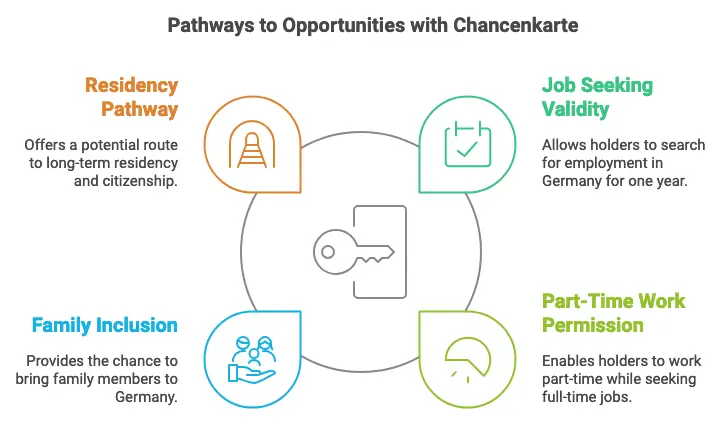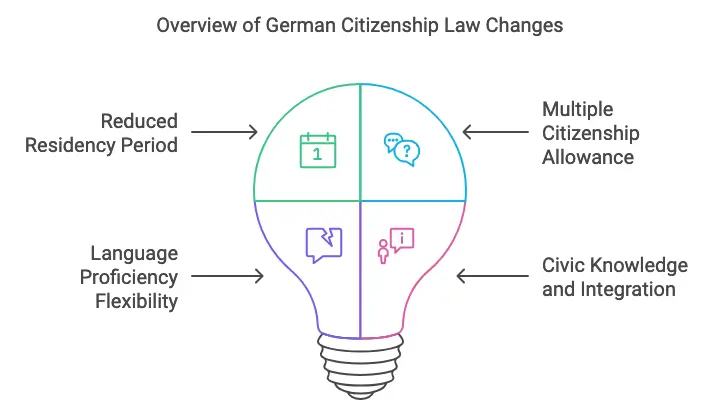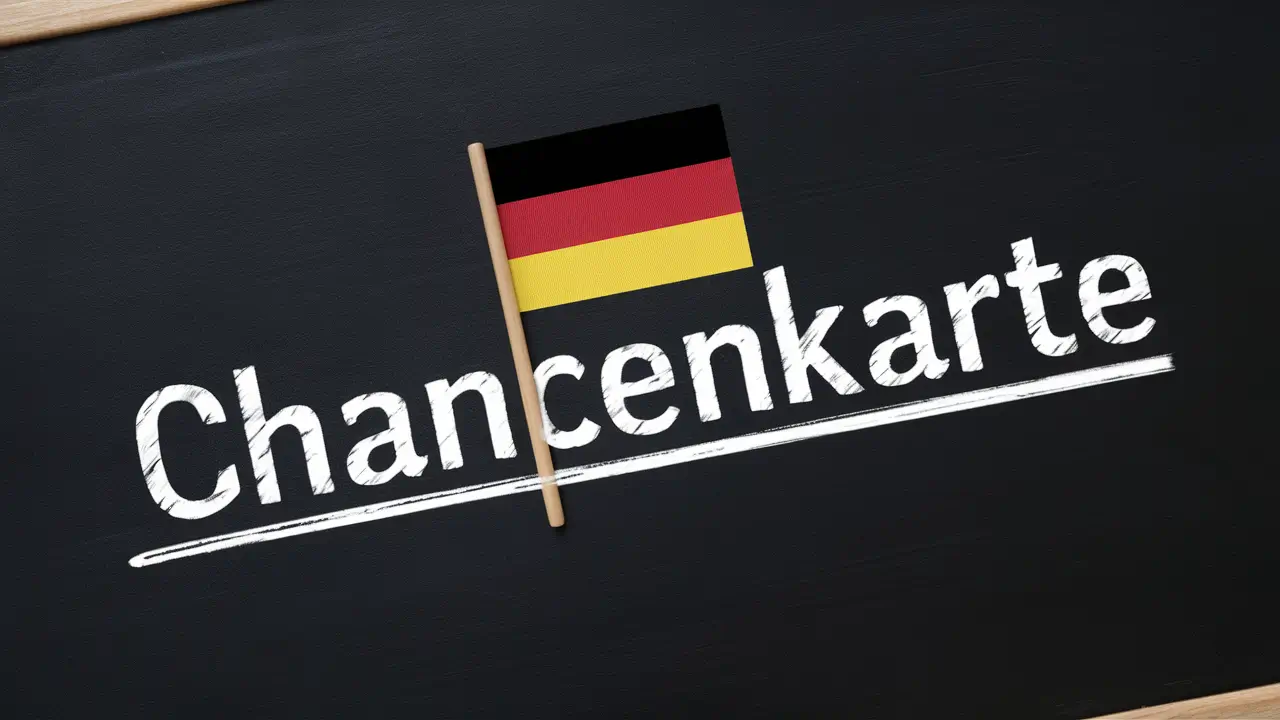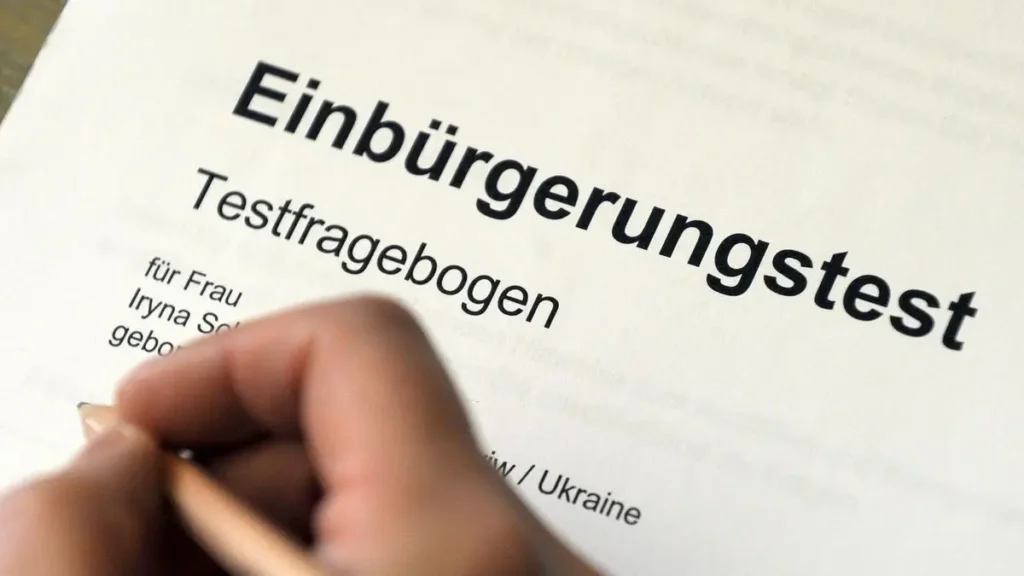Germany has long been an attractive destination for skilled professionals and immigrants seeking new opportunities. With the introduction of the Germany Chancenkarte (Opportunity Card) and recent changes to the German Citizenship Law, the path to becoming a German citizen has become more accessible and streamlined. This article will guide you through the journey from obtaining a Chancenkarte to achieving German citizenship, highlighting the key steps, requirements, and recent legal changes that shape this process.
Understanding the Germany Opportunity card
The Chancenkarte, introduced as part of Germany’s efforts to attract skilled workers, serves as a gateway for many to enter the German job market and potentially pursue long-term residency.
Eligibility Criteria
To be eligible for the Chancenkarte, applicants must meet certain criteria:
- Hold a recognized university degree or vocational qualification
- Have at least two years of professional experience in their field
- Be under 35 years of age
- Demonstrate basic German language skills (A1 level)
- Have sufficient financial means to support themselves during the initial job search period
Benefits of the Chancenkarte
The Chancenkarte offers several advantages to its holders:

- One-year validity for job seeking in Germany
- Permission to work part-time (up to 20 hours per week) while searching for full-time employment
- Opportunity to bring family members to Germany under certain conditions
- Potential pathway to long-term residency and citizenship
How can I apply for the Opportunity Card?
You can apply for the Opportunity Card at the appropriate German mission in your home country, such as the German Embassy or Consulate. If you’re already in Germany, you can submit your application to the local Foreigners’ Registration Office.
However, be aware that you must already hold a valid residence permit or visa. To qualify for the German Opportunity Card, you need to meet specific criteria and may need to provide evidence, such as your professional experience (including vocational training and work experience) or language proficiency (German A1 or English B2). Additionally, you must demonstrate that you have sufficient financial resources, which could be shown through an employment contract for a part-time job (up to 20 hours per week). If you’re interested in finding such a part-time job, please sign up for our newsletter.
The Journey from Chancenkarte Deutschland to Permanent Residency
Transitioning from the Chancenkarte to permanent residency is a crucial step on the path to citizenship. This process involves meeting specific work and integration requirements.
Work and Integration Requirements
To move from the opportunity card to permanent residency, individuals typically need to:
- Secure full-time employment in their field of expertise
- Contribute to the German social security system for a specified period
- Demonstrate continued improvement in German language skills
- Show integration into German society through participation in integration courses or community involvement
Language Proficiency
Language proficiency plays a significant role in the journey to German permanent residency and citizenship. While basic German (A1 level) is sufficient for the Germany Chancenkarte, advancing to higher levels (B1 or above) is crucial for permanent residency and citizenship applications.
The German Citizenship Law 2024
Recent changes to the German Citizenship Law have made the path to citizenship more accessible and flexible for many immigrants.

Key Changes in Citizenship Requirements
The new law introduces several important changes:
- Reduced residency requirement: The standard residency period required for citizenship has been reduced from 8 years to 5 years.
- Special provisions for integration: Individuals demonstrating exceptional integration efforts may be eligible for citizenship after just 3 years.
- Simplified naturalization for children: Children born in Germany to foreign parents can more easily acquire German citizenship if one parent has been a legal resident for five years.
Dual Citizenship Allowance
One of the most significant changes in the new law is the allowance of dual citizenship. Previously, most non-EU citizens had to renounce their original citizenship to become German citizens. The new law permits individuals to retain their original citizenship while acquiring German citizenship, making the decision to naturalize less complicated for many.
Steps to Obtain German Citizenship

The path to German citizenship involves several key steps and requirements.
Residency Requirements
Under the new law, applicants must have lived legally in Germany for:
- 5 years with a regular residence permit
- 3 years for those demonstrating exceptional integration efforts (Check this article for more details about German Naturalization in 3 years)
Language and Integration Test
Applicants must:
- Demonstrate German language proficiency at the B1 level or higher
- Pass the Life in Germany test, which assesses knowledge of German law, society, and living conditions
Financial Stability
Citizenship applicants need to show:
- The ability to support themselves and their dependents without relying on social benefits
- A clean criminal record
- Commitment to the free democratic constitutional order of Germany (discover more about the German political system)
Benefits of German Citizenship
Obtaining German citizenship offers numerous advantages:
- Right to vote and participate fully in the democratic process
- Unrestricted access to the EU job market
- Ability to travel visa-free to many countries
- Enhanced job security and access to certain professions reserved for EU citizens
- Full social and legal protections under German and EU law
Challenges and Considerations
While the path from Germany Chancenkarte to citizenship has been simplified, challenges remain:
- Language barrier: Achieving B1 level German proficiency can be demanding for many.
- Integration expectations: Demonstrating integration into German society requires time and effort.
- Processing times: Despite improvements, bureaucratic processes can still be lengthy.
- Cultural adaptation: Adapting to German culture and social norms is an ongoing process.
Final thoughts
The journey from obtaining a Germany Chancenkarte to achieving citizenship represents a significant life change and opportunity. With the new German Citizenship Law, this path has become more accessible and inclusive. By understanding the requirements, preparing adequately, and embracing the integration process, skilled professionals and immigrants can successfully navigate this journey. As Germany continues to position itself as a welcoming destination for global talent, the streamlined path to citizenship not only benefits individuals but also contributes to the country’s cultural and economic diversity.
Whether you’re at the beginning of your journey with the Chancenkarte or approaching eligibility for citizenship, staying informed about the latest legal changes and requirements is crucial. With determination, patience, and a willingness to integrate, the dream of German citizenship is now more attainable than ever.




